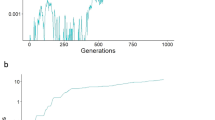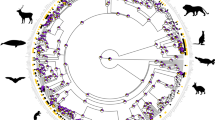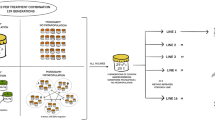Summary
There are two alternative hypotheses for the selective advantages of sex:
(i) The “Fisher-Muller” model: sex facilitates evolutionary adaptation to changing environments.
(ii) The “Ratchet” model: sex minimises the mutational load.
The relative importance of these hypotheses is discussed with reference to (a) comparative data on sexual and asexual reproduction, (b) the timing of sex in species with asexual/sexual alternation, (c) the advantages of haploid/diploid alternation, (d) the disadvantage associated with the recombinational load.
It is concluded that the Ratchet model may well be the major mechanism which maintains sex.
Similar content being viewed by others
Article PDF
References
Dobzhansky, T. 1972. Natural selection and mankind, in The Structure of Human Populations, pp. 213–233. Oxford University Press.
Felsenstein, J. 1974. The evolutionary advantage of recombination. Genetics, 78, 737–756.
Fisher, R A. 1930. The Genetical Theory of Natural Selection. Clarendon Press, Oxford.
Fisher, R A. 1932. The bearing of genetics on theories of evolution. Sci Prog, Oxf, 27, 273–287.
Huxley, J. 1974. Evolution—The Modern Synthesis. Allen & Unwin, London.
Levins, R. 1968. Evolution in Changing Environments. Princeton University Press, Princeton, New Jersey.
Manning, J T. 1976. Anisogamy and the cost of sexual reproduction: are they separate phenomena? J Theor Biol, 55, 393–395.
Maynard Smith, J. 1971. What use is sex? J Theor Biol, 30, 319–335.
Metcalf, R A, Marlin, J C, and Whitt, G S. 1975. Low levels of genetic heterozygosity in Hymenoptera. Nature, 257, 792–794.
Muller, H J. 1932. Some genetic aspects of sex. Am Nat, 66, 118–138.
Muller, H J. 1964. The relation of recombination to mutational advance. Mutation Res, 1, 2–9.
Selander, R K, and Kaufman, D W. 1973. Genic variability and strategies of adaptation in animals. Proc Nat Acad Sci, USA, 70, 1875–1877.
White, M J D. 1954. Animal Cytology and Evolution. Cambridge University Press, Cambridge.
Williams, G C, and Mitton, J B. 1973. Why reproduce sexually? J Theor Biol, 39, 545–554.
Author information
Authors and Affiliations
Rights and permissions
About this article
Cite this article
Manning, J. Is sex maintained to facilitate or minimise mutational advance?. Heredity 36, 351–357 (1976). https://doi.org/10.1038/hdy.1976.42
Received:
Issue date:
DOI: https://doi.org/10.1038/hdy.1976.42
This article is cited by
-
Mutational load and the advantage of sex
Heredity (1984)



